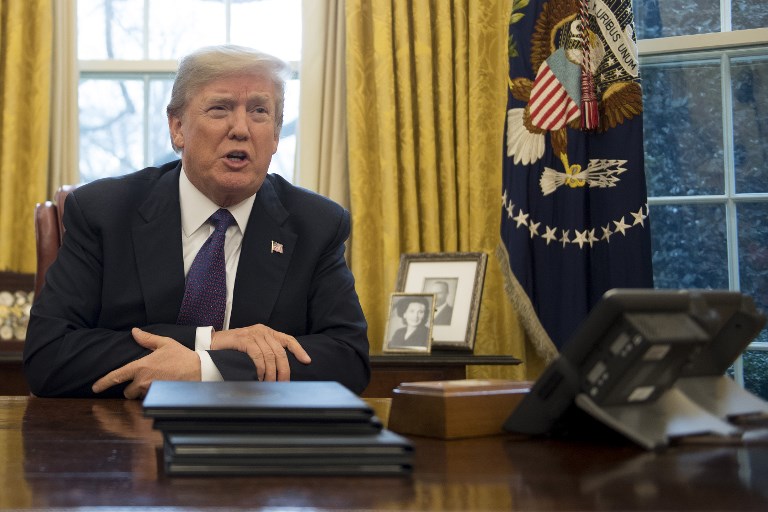
by Douglas Gillison
Agence France-Presse
WASHINGTON, United States (AFP) — President Donald Trump begins 2018 making good on his aggressive “America First” trade agenda, with China as a primary target.
As he prepares to mingle this week with global leaders at the World Economic Forum in Davos, Switzerland, a traditional cheerleader of free trade, Trump has again ruffled feathers from Beijing to Berlin after imposing steep tariffs on imported washing machines and solar panels.
And major decisions are looming on Chinese aluminum, steel and intellectual property.
“We are in a particularly dangerous moment,” Edward Alden of the Council on Foreign Relations told AFP. “This is a continued escalation by the Trump administration.”
Trump rose to office on a nationalist economic agenda, vowing to revive the American manufacturing base by punishing unfair trading practices — pointing the finger squarely at China and Mexico — and reducing bilateral trade deficits.
In signing off on the new tariffs on Tuesday, Trump said the actions “demonstrate to the world that the United States will not be taken advantage of anymore.”
In reaction to the move, interim German Finance Minister Peter Altmaier said Berlin would “talk to our American colleagues,” hoping to make the case for freer trade, while South Korea vowed to bring a case before the World Trade Organization.
‘Pure protectionism’
The latest measures were “pure protectionism” said Scott Miller, a senior adviser at the Center for Strategic and International Studies. The US “just decided to protect these firms at the expense of fair competition.”
US trading partners eager to know just how far Washington will go in erecting new barriers to the prevailing global free trade arrangements will get the answer in the coming weeks, analysts say.
“The first year of the administration at least on trade was a lot of barking and not much biting,” Miller told AFP. Trump’s decisions Monday “are the first actual presidential actions.”
Analysts say the consequences may be limited for washing machines and solar panels, but they are symbolic. And Trump is poised now to make an array of consequential moves, raising the prospect of damaging Chinese retaliation.
The Commerce Department this month has put reports on Trump’s desk on Chinese aluminum and steel imports, that examine whether those products jeopardize American defense industries and thus threaten national security.
His decision is due within 90 days.
Trump also will be in a position soon to decide whether to retaliate against China over the country’s treatment of intellectual property rights. American firms have long complained about investment laws that require foreign companies into sharing valuable proprietary information and technology.
Hurting the ‘red states’?
Trump also has threatened to pull out of free trade pacts, and the latest moves come as negotiations to revamp the North American Free Trade Agreement are at a precarious point with the sixth round of talks underway in Montreal. Those discussions are under the shadow of a trade dispute with Canada over subsidies of Bombardier jets and softwood lumber.
As of November, the Trump administration said it had ratcheted up the number of US anti-dumping and improper subsidy cases by 61 percent over the same period in 2016.
But Miller said despite its tough talk, the White House will be under pressure to avoid leaving the US over-exposed to damaging countermeasures.
“If we did this for aluminum and steel, what would we say when China does it for semi-conductors?” he said. “We’ll have nothing say.”
Beijing could easily decide to retaliate with trade measures targeted to hurt Trump’s political base, he added.
“China might just follow a strategy of what hurts the red states,” he said, possibly blocking US exports of soybeans, wheat or corn. “China can do whatever it wants.”
© Agence France-Presse







